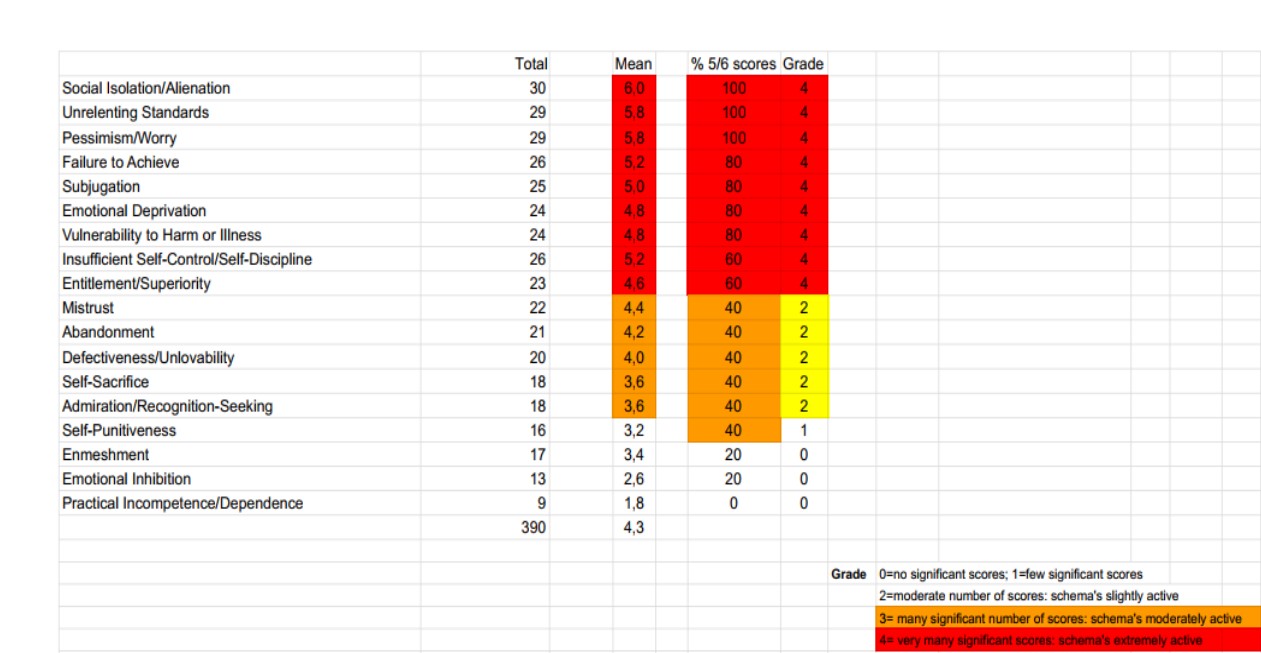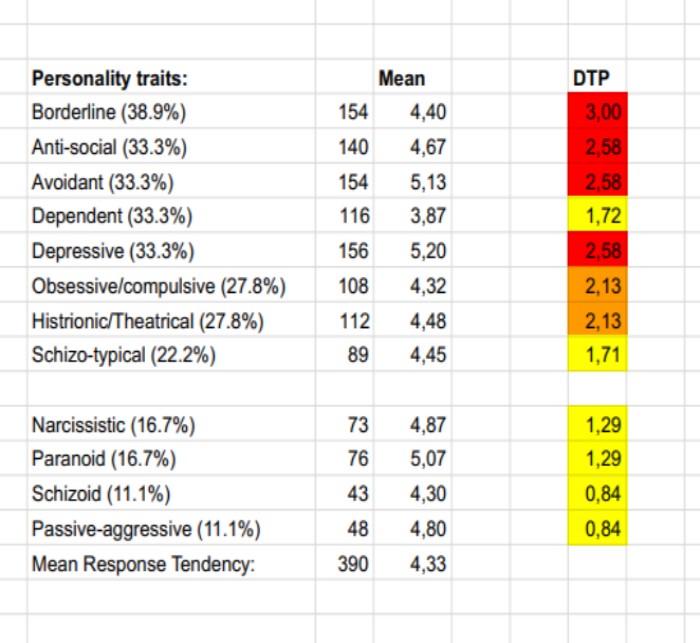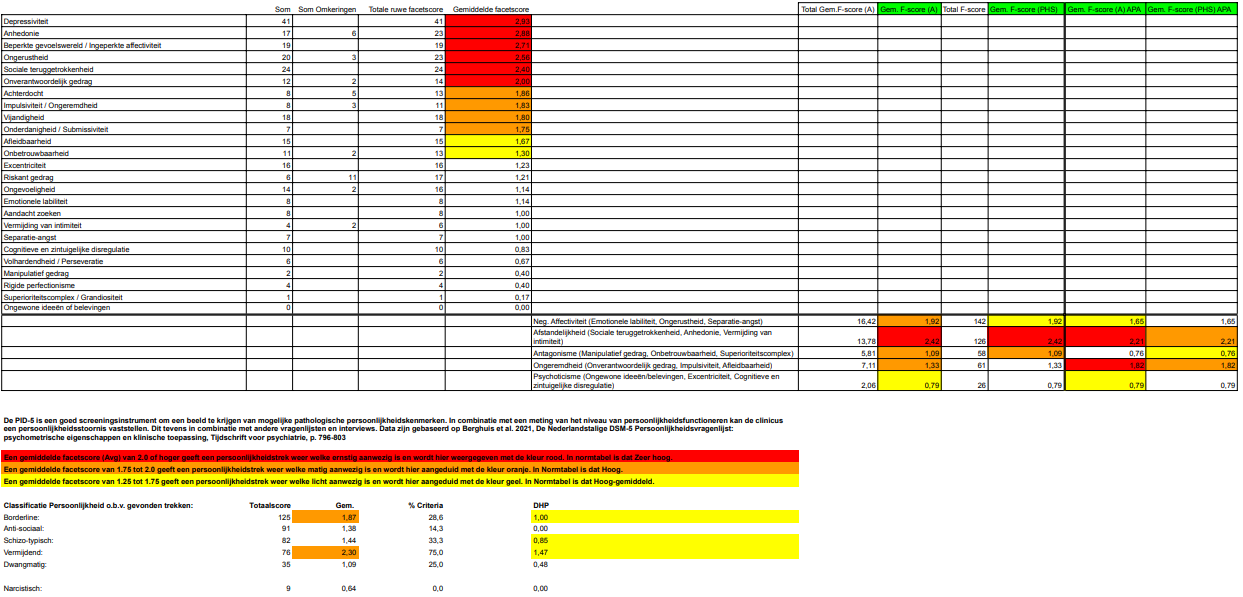- Home
- Personality
- Personality tests
Personality tests online
Ga HIER naar de Nederlandse versie van deze pagina
Below you can fill in 3 Personality tests online and after completion you will receive the report anonymously to your email address. It is advisable, if you are in treatment, to discuss this report with your psychiatrist or psychologist.
PBQ126 (Personality Beliefs Questionnaire)
The first of the 3 personality tests online is the Personality Beliefs Questionnaire (PBO-126): a personality questionnaire containing 126 statements. In this way, what you think of yourself, of another person and of the world around you is measured. These opinions give an impression of your personality.
The PBQ-126 takes about 35-40 minutes of your time and you can complete it on your mobile, tablet or computer. The questionnaire cannot be paused and must be completed in 1 go to give a more reliable result.
Please note: a personality disorder cannot be diagnosed with this questionnaire alone. More research is needed for that. For example, by also completing the PID-5, the YSQ3 and an extensive interview with a psychologist.
The original PBQ126 was developed by A.T. Beck & J.S. Beck (1995). To my knowledge this is the only online version of the PBQ126. This version is for non-commercial use only!
Example of PBQ126 report

Above is a PBQ126 report. It is automatically sent without any personal data, to the specified email address you have entered.
A clear order is made of the strongest personality types. The average score is taken into account, but also how often the most extreme scores have been filled in. Based on this, a severity measure (DTP) is drawn up. This severity measure is used in the Diagnostic Tool for Personality research to weigh the scores of 3 questionnaires: the PBQ126, the YSQ3 and the PID5. In the table above, the chance of a paranoid personality is very high, with borderline and avoidance traits very likely as well.
At the bottom of the report, the individual questions with scores are shown (not visible here). In this way, a therapist can carefully check which questions have been answered in the extreme.
Click here to fill in the PBQ126
YSQ3 Schema-questionnaire
The second of the 3 personality tests online here is the YSQ3 schema questionnaire: a commonly used questionnaire to detect cognitive schemas (based on J. Young's schema theory). It is not seen as a personality questionnaire, but it does examine several fundamental ideas of someone. In that sense, it is a very useful tool to map someone's personality, together with the PBQ-126 and the PID-5. It will take you approximately 30 minutes to complete.
Click HERE to fill in the YSQ3
This YSQ3 report is easier to read than elsewhere
Judge for yourself about the clarity of the online report recently released by the Schema Therapy Association (The Netherlands) on their site compared to the report on this site. The report is of course about one and the same real client.
Even more important is that the YSQ data are translated into DSM-5 personality types in accordance with the manual in the Praktijkboek Persoonlijkheidsstoornissen by Adriaan Sprey. Together with the 2 other questionnaires PBQ126 and the PID-5, you can use the DTP algorithm to see in a more structured and reliable way which personality types clearly emerge. Try it yourself!
Example of the YSQ3 report

Above is an example of the YSQ3 questionnaire report as used on this site. It is clear to see that it is very clear and easy to read.
Below you see an example of the YSQ3 report that also classifies the schemas in the DSM-5 personality types.

PID5 (Personality Inventory for DSM-5)
The third of the 3 personality tests online is the PID-5. This is a more extensive personality questionnaire with 220 questions and it also focuses more on other personality traits (based on the Big Five personality theory) than the PBQ-126. Completing this PID-5 will take you approximately 45-60 minutes of your time.
Example PID5 report

Above is a PID5 report. The strongest personality traits are shown in an order. Using color coding, the strength of these properties can be seen even more clearly.
The standardization table on the right can also be color coded. Both the norm scores of Berghuis et al. and the APA have been incorporated. This makes it clearer to read whether some traits clearly deviate from the 'healthy sample' and from the 'abnormal' sample (=people with personality disorders).
At the bottom of the report, the individual items with scores are shown (not visible here). So that it is always possible to see how someone scored per question.
Click HERE to fill in the PID5
SMI-1: Schema Modi Questionnaire
The SMI-1 is a somewhat different questionnaire than the lists mentioned above. This list mainly tries to measure someone's different styles of responding (so-called Modi). These modes are used within Schema Therapy. Here too, the SMI report is, in my opinion, clearer than the one used by the Dutch Schema Therapy Association.
Click HERE to fill in the Dutch SMI-1 (English version coming soon!)
Personality tests online for everyone! (with reports)
As a private individual and/or client of a psychologist or psychiatrist, you can complete 3 questionnaires below that say something about your ideas and therefore your personality. A report will be sent automatically to the email address you provided.
Using an algorithm, called DTP, a report is drawn up which weighs the input of the 3 questionnaires below. See further explanation below.
The service depends on Google services and is free. It is therefore possible that it does not work 100% due to malfunctions in the Google services.
In that case you can send an e-mail to the e-mail address stated at the end of a questionnaire.
NB! : Complete the DTP questionnaire after you have completed 3 questionnaires! See below.
DTP: Diagnostic Tool for Personality research
Below you can - after you have completed the PBQ126, YSQ3 and PID5 - request the Diagnostic Tool for Personality research (DTP). You do this at the bottom of this page, where you enter the email address with which you also completed the 3 questionnaires. The DTP integrates 3 questionnaires via an algorithm: PBQ126, PID-5 and the YSQ3. The PBQ126, YSQ3 and the PID5 are each ordered with a specific weight in order to map out the strongest personality traits as accurately as possible. The ordering of traits is based on the model within the Diagnostic and Statistical Manual of Mental Disorders (DSM-5), the psychiatric handbook for mental-emotional problems.
With the DTP in his hand, the clinician can therefore focus an interview on specific personality traits.
The whole idea is that personality diagnostics is more structured, more data-driven and purer in this way.
N.B.: Individuals can also request this DTP report. However, they should discuss this with their therapist or psychologist.
Request DTP report
Only if you have completed the 3 questionnaires PBQ126, YSQ3 and PID5, you can request the DTP report here.
Personality disorder or not?
I think the term personality disorder is the wrong word. 'Disorder' comes from the medical profession where a disease may or may not be present. However, with many psychological illnesses there is an increasing realization that there is no question of whether or not there is a deviation, but rather that there is a continuum of severity of complaints. That is to say: everyone has certain symptoms to a greater or lesser extent and the more severe and more frequent they are, the more one can speak of a deviation from the average. To call this a 'disorder' is doubtful in the context of personality traits, because here it is precisely the judging of people that can stand in the way of treatment.
Advantages of this form of Personality research
- FREE, EASY AND FAST: Personality diagnostics or research can be applied much more quickly in your practice this way. It may take the client some time, but you just wait for the results.
- SECURE AND SIMPLE: Clients can easily take the tests on their mobile, tablet or computer in their own environment. The reports are sent anonymously.
- CLEAR REPORTS: the reports show the strongest traits in a clear overview and ordered. Color coding also helps to identify the strongest personality traits.
- POSITIVE PSYCHOLOGY based on a COGNITIVE MODEL: the 3 questionnaires are based on the cognitive model of personality disorders. It offers direct insight into the personality and clearly indicates which excessively present thinking patterns need to be worked on.
- GIVES DIRECTION FOR STRUCTURED INTERVIEW: The DTP algorithm shows the strongest personality traits and also which are most likely to be disorders. This allows for a shorter version of a structured interview such as e.g. the SCID5, tailored to specific traits.
- STATE OF THE ART: Unfortunately, the digital version of these newfangled questionnaires did not yet exist in this form. Now they do!
Have A Great Story About This Topic?
Do you have a great story, remarks or any additions to or about this? One that could help other people as well and above all is constructive? Then please share it!
DISCLAIMER
I will not take any responsibility for how the information on this website will affect you. It always remains your responsibility to handle all information with care and in case of medical or mental problems you should ALWAYS consult a professional in your neighbourhood!
Ik neem geen enkele verantwoordelijkheid voor hoe de informatie op deze site u zal beïnvloeden. Het blijft altijd uw verantwoordelijkheid om al deze informatie zorgvuldig te bekijken. In het geval van lichamelijke en/of mentale problemen dient u ALTIJD een professional in uw directe omgeving te waarschuwen!

